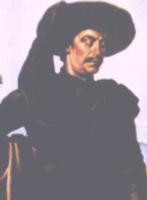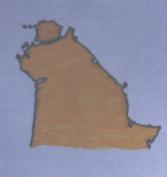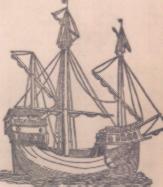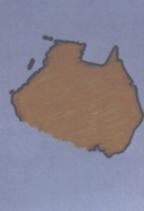
The Unwritten History Of Australia
Chapter 23
|
Portugal and Spain and
the Land Of Gold
|
"As you have laudably imitated the most serene infant dom
Henry, your uncle, in sparing neither efforts nor expense to
demonstrate the sphericity of the earth, and succeeded in bringing
under your sway the sea of Guinea as far as the tropic of
Capricorn, with the products thereof, viz, gold, grains of Paradise*.
you have won praises, immortality and glory, together
with very great profits."
Portion of letter to
Prince Henry the Navigator,
from Hieronymus Monetarius,
Doctor, of Nuremberg, Germany,
July 14th, 1493
{*Malaguetta pepper}
|
Pyramids
in the Pacific Ch 23
|

|
Prince Henry
As the European renaissance dawned in the 15th century, the dictatorial power of the Roman Catholic Church came into question. It has held power throughout the Middle Ages with the weapons of fear and torture. It had placed limits upon knowledge, controlling people's minds with religious superstition.
Now this power began to disintegrate, and in the wake of the new intellectual freedom, men's thoughts turned from pios crusaders to the Holy land to search for new lands beyond Europe, and the search for the Spice Islands; and a chain of events were set in motion which culminated in the discovery of the America's and Australia.
These 'discoveries ' however, as we have seen, were in truth merely 're-discoveries', and in these voyages of the new 'Age of discovery', Portugal would lead the way, to be followed by Spain, Holland and lastly Britain. The evidence for Portuguese and Spanish landfalls on Australian shores consists largely of intriguing archeological finds, surviving maps and written records, but do to the scarcity of accurate documentation, conservative historians are today unprepared to commit themselves on the issue.
Such fears did not however trouble the great George Collingridge, who late in the 19th century had the courage to speak out on what he considered to be an indisputable fact. To find the reasons for this lack of historical material, we must realise that in those times both Portugal and Spain were bitter rivals in the race to open up and claim new territories in the Pacific region.
Although both were great maritime nations, little Portugal was conscious of her inferior military power compared to the might of Spain, keeping her Pacific discoveries secret, hiding maps and records in government archives lest Spain should learn of her discoveries. The Spanish government thought the same way as her rival, so that everytime an expedition returned to home port from a mission of exploration, all maps and records of the voyage were confiscated by government officials.
Maps of Australia drawn by Portuguese explorers were deemed of such importance that the Kings of Portugal forbade, upon pain of death, the passing on of any maritime chart to any foreign power which showed the course of the "Great South Land". The same law was likewise introduced in Spain. These maps and records remained unknown for so long that, after both nations declined as maritime powers, their accomplishments went unknown, hidden away for centuries.
Only in recent generations have historians begun to rediscover these lost maps and manuscripts, which are beginning to paint an entirely different new picture of these rival nations maritime achievements.
We would know a great deal more about the early maritime achievements of the Portuguese explorers, and their voyages into the Australian-Pacific region in particular, had not most of the nation's records been totally destroyed in the great Lisbon earthquake of Saturday November 1st, 1755 during which the archives housing the documents and maps were burnt and destroyed, together with the rest of the city and many thousands of its inhabitants.
Portugal certainly led the way in maritime skills as the renaissance wore on. This hardy little nation's seafaring achievements owed their success to the foresight of one man. Prince Henry the Navigator. Born in 1394, Prince Henry was the son of the Portuguese prince Joao {later King Joao the 1st}, and an English Princess, Philippa of Lancaster, daughter of John of Gaunt.
In 1419, Henry rejected the then popular superstition that there were no lands beyond the vast Atlantic Ocean. For he reasoned from the writing of the Greek, Roman and other geographers, that other lands already known to the ancients awaited re-discovery beyond the horizon.
|
Pyramids
in the Pacific Images
Ch 23
|

|

|

|
|
Dauphinmap 1536 |
Portuguese Caravel |
Dauphinmap Modern |